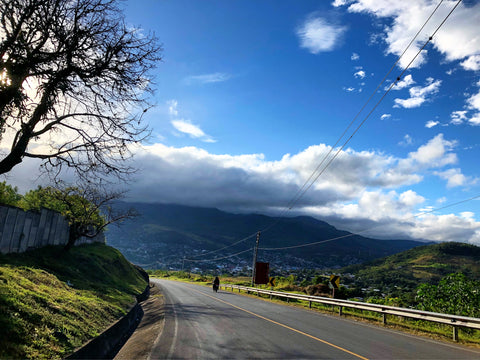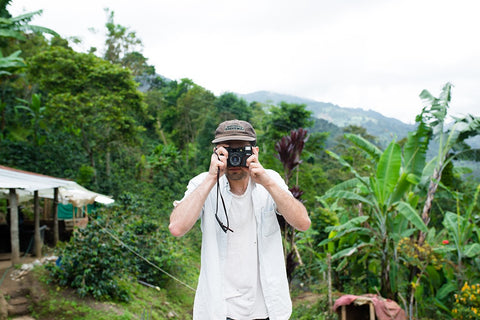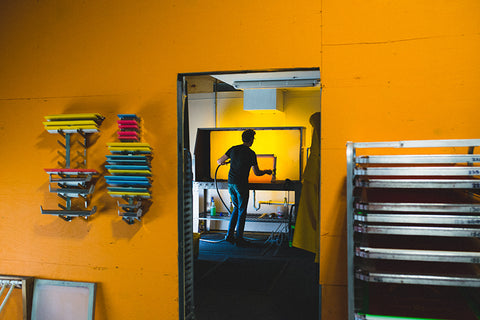For the past two months I have been watching a political crisis unfold in Nicaragua. Most likely, you won’t see a lot of information about the latest unrest in Nicaragua on any mainstream media unless you deliberately search for it. To most, Nicaragua hardly registers on their radar. It’s a small central American country where crime and political corruption are an unfortunate side effect of years of civil war and the manifestations of proxy wars waged by larger, more powerful nations.
For those of us who have a personal connection with Nicaragua and have been following the events as they develop, a feeling of helplessness and concern for the safety of friends and colleagues has overcome our thoughts. Friends we know living in Nicaragua have expressed their fear and uncertainty for the future of their country, but they remain hopeful that positive change will come out of the violent unrest they're now enduring.

Nicaragua's political and social turmoil has had specific effects on the coffee industry. The export of coffee has been impeded, or in some cases completely halted by roadblocks or protests throughout the country. The mountain communities where coffee is grown have been relatively safe - tucked in between the mountains far away from the larger cities where most the violence has occurred, however these communities are still affected by difficulty in transporting food and other goods. Scarcity of resources has led to localized violence in more rural areas as people struggle for access to food and other basic necessities.
Our friend Elisabeth Elliott lived and worked in Matagalpa, Nicaragua at the Nicaragua Christian Academy from 2013-2016. During that time she was immersed in Nicaragua’s unique culture. I sat down with Elisabeth the other week to talk about our shared heartbreak seeing the recent events in Nicaragua unfold. She wrote the selection below to share reflections of how her friends who live there are taking to the current events. We both wanted to share this story with you to raise awareness of the events taking place in Nicaragua. Though we work to remain apolitical in situations like these, being a part of the Specialty Coffee Industry forces us to be aware as global citizens, and we cannot ignore the fact that people are losing their lives at the hands of their own government. Violence and repression of a people is rarely the proper solution for political unrest, so the current situation in Nicaragua remains volatile at best. Unfortunately, it is all too common to see coffee arriving to the US from conflict riddled areas of the world - all the more reason to take a moment to consider the people involved in producing that coffee - the hardships they endure, risks they take, and how that fits into your own coffee consumption choices.
-Tamara South
~~~~~~~~~~~~~~~~~~~~~~~~~~~~
A political crisis has unfolded in Nicaragua over the last six weeks—have you heard about it? When the government announced a significant tax increase in mid-April, it was met with small-scale protests in Managua, primarily involving the elderly and a smattering of university students. Beginning on April 19, those protests were met with violent repression by the national police. For the Nicaraguan people, the images of their elderly beaten and bloody was the straw that broke the camel’s back. The nation erupted in protests against a government they perceive as corrupt and totalitarian. Since then, daily peaceful protests have been met by increasingly violent repression. This article gives a more in-depth analysis of how the events have unfolded.

When Americans think of Nicaragua, they often have in mind images from the civil war in the 80s. It may be difficult to comprehend that over the last three decades, Nicaragua has become the safest country in Central America, with extremely low rates of violent crime, a booming tourism industry and a growing national economy. As in many developing countries, day-to-day life was hard, but it was stable. Kids had math tests, played street soccer, went to birthday parties, and had bed times. The police gave speeding tickets and directed traffic.
Today, after over two months of unrest, the picture is very different. The police’s tear gas and rubber bullets were quickly replaced by live ammunition and automatic weapons. Armed paramilitary groups that are supportive of the government, along with the national police, have wrought unimaginably atrocious violence across the country, resulting in a lawless state of terror. Roadblocks make getting to school impossible for many students and their teachers. Essential items like food and gasoline are beginning to be difficult to access. Regular nightly violence against anti-government groups has everyone locked in their homes by 5pm daily and makes sleep hard to come by. Parents have the impossible task of trying to prepare their children about the possibility of their imminent death.

One friend and his wife are expecting their first child in the next few weeks. Because of the breakdown of the health system—all state hospitals are refusing to treat anyone who they perceive to be associated with protests, and private clinics are overwhelmed by the number of wounded people—they are preparing for a home birth and hoping for no complications. Another friend, who has spent his entire life working tirelessly to pull his family out of abject poverty, and who just finished building with his own two hands a small home for his family, is confronted with the decision of whether to try to move his family to Costa Rica. They would be safe there, but he and his family would be financially destitute, beginning again the cycle of poverty he has worked so hard to overcome.

During my time living in Matagalpa, Nicaragua, this country and its people—in all their brokenness and complexity—found their way into my heart. This is “the country under my skin,” as one Nicaraguan author puts it. As I’ve watched these events unfold from my safe home in Richmond, Virginia, I’ve felt heartbroken, fearful, confused and indignant. I’ve also felt swelling pride that brings me to tears.

My Nicaraguan friends all tell me the same things. They feel sad, afraid, confused, vulnerable and full of uncertainty. They are all exhausted. And yet every single one is full of hope about the future. Nicaragua is not the same place it was two months ago, and Nicaraguans are not the same people. Whereas oppression had once buried their sense of dignity, empowerment, creativity, and hope for the future, things are different now. One friend says, “It’s like we’ve realized all that had been lost.” It is as they have spent decades living in the dark, and all of a sudden someone turned on all the lights.

I’ll end with this poem, written by renowned Nicaraguan poet, Gioconda Belli. At the time of writing, only nine days into the crisis, the reality of thirty victims was heart-wrenching. Now, two months later, over 280 citizens have been killed—most of whom are young university students—over 1,000 injured and hundreds “disappeared," and counting. “Before going, they turned on all the lights.”
THIRTY, AGAIN
Gioconda Belli—Abril 28, 2018
“Thirty that loved her like I do” -Augusto C. Sandino
I've seen Nicaragua come out of the corner of fear.
I've seen her defy the metallic forest,
stand up in the prohibited rotundas.
No more beatings, she's said.
She's said it in the face of tear gas.
She said it when they beat her.
She said it when the rubber bullet took out his eye,
when one by one they pulled out their finger nails,
when in the middle of a broadcast, they killed him.
April, the month of fire.
In the time of the barricade and ignominy,
liberation began.
It was a matter of pulling up the cobblestone of our hearts,
making the trench and saying no more,
enough,
denying cruelty, indifferent complicity.
I don't cry. My eyes just burn.
There were thirty again.
Thirty who, before going,
turned on all the lights.
-Elisabeth Elliot





